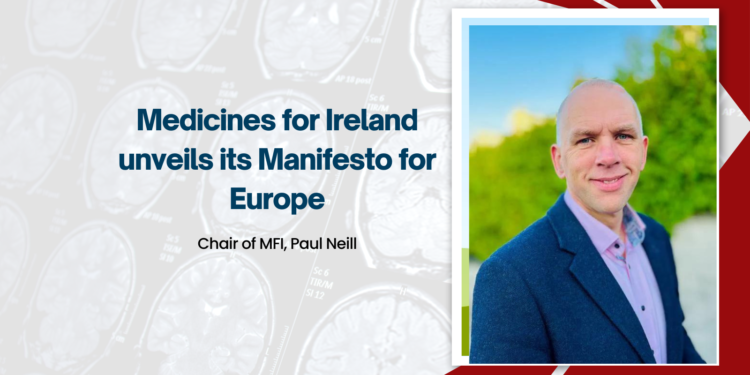Chair of MFI, Paul Neill
Suppliers of generic, biosimilar, and value-added medicines call for reform of EU pharmaceutical laws to ensure equitable access to treatments for all patients.
Increased penetration of generic, biosimilar, and value-added medicines will be critical to enhancing treatment accessibility for patients, while managing the healthcare spend of EU member states. That’s the message from Medicines for Ireland (MFI) to European election candidates in its ‘Manifesto for Europe’ setting out the association’s key European policy asks.
In its manifesto MFI is calling for:
1. Equitable access to essential medicines through the introduction of pro-competitive measures that ensure early entry of generic, biosimilar, and value-added medicines into the Irish market.
2. Safeguarding of Europe’s pharmaceutical production through the adoption of a Critical Medicines Act to bolster manufacturing competitiveness, mitigate supply risks, and support investments in
cutting-edge, sustainable manufacturing technologies and workforce upskilling.
3. The establishment of a contemporary regulatory framework to keep pace with scientific and technological progress by fast-tracking digital and regulatory efficiency measures within new EU pharmaceutical legislation.
4. Promotion of healthcare innovation through the introduction of legislative measures that reward innovation while ensuring affordability.
Commenting, Chair of MFI, Paul Neill said: “Access, affordability, and availability are central to our future vision of healthcare in Ireland and must be championed in Europe by our new cohort of Irish MEPs. Pro-competitive measures in EU pharmaceutical and intellectual property legislation, need to act as a key enabler to facilitating earlier entry of generic, biosimilar, and value-added medicines in the Irish market. Under the direction of the 10th European Parliament, we urgently need to see EU pharmaceutical laws reformed to drive greater competition, and support investment in affordable off-patent innovation.
“A shift in policy thinking is also required to secure availability of medicines for patients which is a challenge members states, including Ireland continue to grapple with. Fostering timely competition and sustainable uptake of generic, biosimilar, and value-added medicines would significantly help shape a future where shortages are an exception rather than the norm. Furthermore, we would like to see the adoption of a Critical Medicines Act to promote open strategic autonomy in healthcare and restore medicines manufacturing competitiveness across Europe. This in turn would reduce dependency risks for essential medicines, also easing pressures on supply.”
MFI has continuously advocated for legislative reforms that guarantee every patient in Ireland and across Europe has access to the essential medicines they need. The associations policy asks, aim to secure a regulatory environment that keeps pace with science and technology evolution, ensuring Irish patients have early access to new medical innovations.
Commenting, Vice-Chair of MFI, Deirdre Kelly said: “The forthcoming European elections hold significant weight in shaping the future of health policy in Europe, a factor that directly influences the levels of shortages Irish patients endure. Irish MEPs will play a pivotal role in the future policy development and implementation that impacts national health systems and the well-being of citizens in Ireland and across Europe.
“As part of this, we need to see fast-tracking of digital and regulatory efficiency measures within new EU pharmaceutical legislation, recognising the urgency of modern healthcare needs. We are calling on Irish MEPs to pursue measures that enable regulatory flexibility to prevent shortages, including spearheading the swift adoption of Electronic Product Information Leaflets (EPIL). This goes hand in hand with the establishment of a viable shortage prevention and mitigation policy.”
Ms Kelly concluded: “In reforming EU pharmaceutical legislation we want the bolar clause exemption to be explicit on facilitating any activities that need to be undertaken to allow generic or biosimilar medicines launch immediately after the expiry of an originator patent. Furthermore, the definition of repurposed medicines needs to be expanded beyond new indicators to include value-added medicines. These issues are of utmost importance for health systems to realise increased value from their medicine spend and to broaden patient access to medicines.”
MFI’s ‘Manifesto for Ireland’ asks align with those made by its European sister association Medicines for Europe (MFE), which will host its 30th Anniversary Annual Conference in Dublin from 12th – 13th June. The themes of the upcoming conference resonate with the pillars of MFI’s manifesto, focusing on access to medicines, innovation, and sustainable healthcare solutions. The conference will serve as a platform to further these discussions, fostering collaboration and progress towards a healthier Europe.
MFI member companies include Accord Healthcare, Celltrion Healthcare, Clonmel Healthcare, Consilient Health, Fannin, Fresenius Kabi, Pinewood Healthcare, Sandoz trading as Rowex, Teva, and Viatris.









